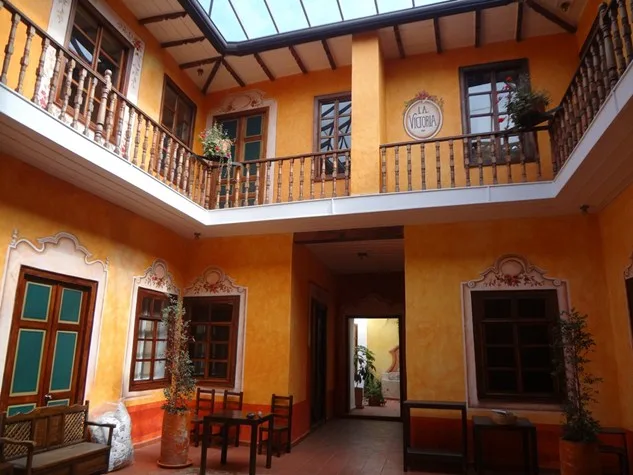UN training program helps some Venezuelans escape poverty in Ecuador
By Ilaria Rapido and Jaime Giménez
On graduation day, proud parents Osmar and Valeria beamed with pride. But this very special graduation honored the accomplishments not only of the couple’s two school-age children but rather of the whole family, marking their completion of a program aimed at helping lift refugees out of extreme poverty and giving them the tools to rebuild their lives.

Osmar and Valeria on graduation day.
“They trained us in entrepreneurship, and we also took a class about how to manage our finances,” said Valeria, a 32-year-old former hairdresser from Venezuela who opened her own event planning business after fleeing to Ecuador. “Things haven’t been easy, but it [the program] has helped cover many of our needs.”
The family’s struggles began back in their native Venezuela, as the country sank into an ongoing crisis that has led to widespread food and medicine shortages, galloping inflation, and a generalized breakdown of the social order.
One day in November, 2017, Osmar, Valeria and their kids spent the night at a relative’s house, only to discover that squatters had seized the opportunity to invade their home. They tried to get their house back, but their efforts were in vain and they had no option but to flee the country.
They managed to scrape together enough money for bus tickets to Ecuador, the South American nation that has absorbed some 400,000 of the estimated 4 million Venezuelan refugees and migrants now living outside their country.
The trip itself exhausted their savings, leaving them stranded in Quito bus station for a week. After receiving accommodation assistance from UNHCR, the UN Refugee Agency, and its partner in Ecuador, the family was selected to participate in a refugee integration and poverty prevention program known as the Graduation Model.
The program aims to support the most vulnerable refugees — including single mothers, large families, and those who lack a support network in their host country. Because steady income is one of the most crucial predictors of refugees’ success in their host countries, the program hopes to give participants the tools they need to make a living.
Selected beneficiaries are provided entrepreneurship and vocational training, seed money and mentoring to help them learn new skills and start small businesses, as well as psychological support to accompany them through this process. Since 2015, more than 3,150 refugee families in Ecuador have been through the program, which is run by UNHCR partner the Hebrew Immigrant Aid Society.
The guidance they received helped Valeria, who owned her own beauty parlour in Quito, pivot toward a new profession as an event planner and decorator. Her husband, 38-year-old Osmar, also shifted gears, trading his former job as an auto mechanic to work as a DJ, thanks to a grant and seed money from the program that allowed him to enrol in a course and buy equipment.
The program has also helped open new opportunities for Deilys, a 36-year-old mother of two and asylum seeker from Venezuela, who fled to Ecuador in December 2017 after government officials threatened her and her husband in retaliation for their political opinions.
Back home, Deilys worked in logistics for a car rental company, but thanks to the mentoring and classes in entrepreneurship she took through the Graduation Model program, she is now making a splash in Ecuador’s emerging health food sector.
With the seed money, she bought such basics as an oven, a fridge and a mixer, allowing her to make the vegan desserts she now sells at street fairs and other events. She hopes to open her own shop soon.
“This process has given us the tools for us to subsist, survive, and make headway,” said Deilys, adding the programme had allowed her and her family to assume a “we can do it” attitude.
“We don’t have everything but we’re living well,” she said. “We have no debts and we’re never behind on the rent, and when birthdays roll around, we have enough to buy gifts for our kids.”
Families “graduate” from the innovative program when their income exceeds the poverty line; when they are able to eat three nutritious meals a day; when they manage to save at least five per cent of their monthly income; and when they have built a local support network.
Osmar and Valeria graduated after 18 months in the program. They have since gone through both good and rough times. The promise of an event planning job in another city turned out to be a scam that all but wiped them out financially.
But they ultimately were able to move back to Quito and have picked up their event planning venture where they left off. In the meanwhile, their aspirations have grown exponentially. The family have set their sights on opening their own events venue, where Valeria would organize parties and weddings and Osmar would provide the music.
“It’s my biggest dream,” said Osmar.
The economic inclusion of refugees was one of the topics under discussion at the Global Refugee Forum, a high-level meeting held in Geneva last month. It brought together governments, international organizations, local authorities, civil society, the private sector, host community members, as well as refugees themselves.
The Forum, the first of its kind, included announcements about high-impact contributions aimed at giving refugees a chance to use and further develop their skills and contribute economically to their host communities.
________________
Credit: EIN News, https://world.einnews.com/article_detail/506276593/i7ZBjFV3KVlcid_u?n=2&code=L1gR_dOn4xIAxuS0&utm_source=NewsletterNews&utm_medium=email&utm_campaign=Ecuador+News&utm_content=article





















